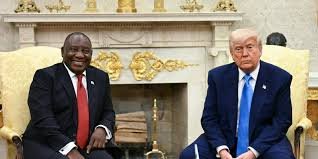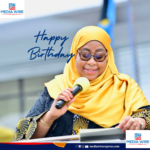South African President Cyril Ramaphosa returned from Washington this week bruised but not broken, after a tense and widely publicised encounter with former US President Donald Trump.
What was meant to be a diplomatic reset and push for trade cooperation turned into a combative public confrontation.
Hoping to salvage the African Growth and Opportunity Act (AGOA) trade deal and attract investment to stimulate South Africa’s faltering economy, Ramaphosa instead faced a high-profile rebuke. Trump, relying on a discredited dossier, accused South Africa of persecuting white farmers — a claim dismissed internationally. The American president even aired footage of opposition leader Julius Malema singing a controversial song, “Shoot the Boer,” to support his case.
Despite the charged atmosphere, Ramaphosa remained composed and measured, earning praise from some for his diplomacy, though others criticised him for not firmly refuting the claims.
Back home, Ramaphosa now confronts escalating domestic challenges. His African National Congress (ANC) governs through a fragile coalition of 11 parties, formed after the ANC’s worst electoral performance since the end of apartheid. The coalition has been beset by internal clashes over land reform, healthcare policy, and taxation. A failed budget proposal nearly collapsed the alliance earlier this year.
South Africa’s broader woes remain acute: the economy is stagnant, crime and corruption are rampant, unemployment is high, and public infrastructure is decaying. Ramaphosa faces persistent questioning over the effectiveness of his leadership and policies.
Also Read: Tanzania, Finland Strengthen Trade and Development Ties
Compounding his difficulties, the ANC itself is increasingly divided. Factions have begun manoeuvring ahead of a pivotal 2027 elective conference that may produce a new party leader. Meanwhile, Ramaphosa’s critics, including Malema and former president Jacob Zuma, have intensified their attacks, seeking to exploit the ANC’s vulnerability.
Ramaphosa’s appeal to Trump focused on job creation and economic stability. The AGOA deal, which allows duty-free access to US markets for certain South African exports, is crucial to bolstering growth. But with Trump’s inward-looking stance, the future of the agreement remains uncertain.
Despite the contentious meeting, Ramaphosa may have emerged with his stature at home reinforced. His calm under fire reminded many South Africans of his legacy as a negotiator during the transition from apartheid and as a stabilising force during Jacob Zuma’s tumultuous presidency and the COVID-19 crisis.
Verashni Pillay, editor and founder of explain.co.za, suggested that Ramaphosa’s performance under pressure could boost his approval ratings. “He thrives in tense situations,” she noted. “His experience in navigating high-stakes political crises is unmatched.”
Polls continue to reflect what analysts call the “Ramaphosa Effect” — his personal popularity often outpaces that of the ANC itself. A recent survey by the Social Research Foundation indicated that without Ramaphosa, the ANC’s support would likely decline further.
While criticisms of Ramaphosa’s slow and cautious leadership persist, his Washington visit may have reminded the country why he remains a central, steadying figure in a deeply fractured political landscape.



